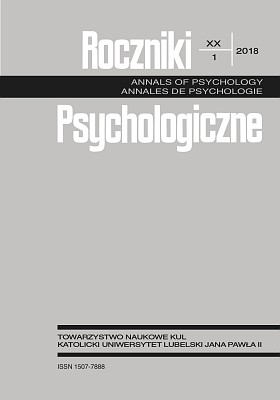A new form of friendship among young adults in Poland: Identification of the friends with benefits phenomenon
Abstrakt
Close friendship is one of the most fundamental issues in psychology. It is a universal relationship in terms of which it is possible to describe every human being, since every individual engages in it. The quality of close friendship relationships is one of the essential conditions of mental health. A close friendship generates space in which to fulfill the most fundamental human needs. The aim of this empirical study was to identify a new form of close interpersonal relationship, called “friend with benefits” and defined as friends having sexual relations. The results of the empirical study allow us to explore this phenomenon, discuss differences in the quality and intensity of the friends with benefits relationship between men and women, and draw some important conclusions.
Bibliografia
Arunkumar, T. S., & Dharmangadan, B. (2001). Friendship Intensity Measurement Scale. Psychological Studies, 46, 58-62.
Bisson, M. A., & Levine, T. R. (2009). Negotiating friends with benefits relationships. Archives of Sexual Behavior, 38, 66-73.
Buss, D. M., & Schmitt, D. P. (1993). Sexual strategies theory: An evolutionary perspective on human mating. Psychological Review, 100, 204-232.
Copen, C. E., Daniels, K., & Mosher, W. D. (2013). First premarital cohabitation in the United States: National survey of family growth. National Health Statistics Reports, 64, 1-15.
Fielder, R. L., & Carey, M. P. (2010). Predictors and consequences of sexual ‘‘hookups’’ among college students: A short-term prospective study. Archives of Sexual Behavior, 39, 1105-1119.
Giza-Poleszczuk, A., & Marody, M. (2004). Przemiany więzi społecznych [Transformations of social bonds]. Warsaw, Poland: Scholar.
Grello, C. M., Welsh, D. P., & Harper, M. S. (2006). No strings attached: The nature of casual sex in college students. Journal of Sex Research, 43, 255-267.
Król, M. (2005). Bezradność liberałów [The helplessness of liberals]. Warsaw, Poland: Pruszyński i S-ka.
Lehmiller, J. (2013). Czy relacja typu “friends with benefits” to dobry wstęp do związku? [Is a “friends with benefits” relationship a good beginning of a relationship]. Interview by M. Pietrzak. Retrieved from: https://www.edarling.pl/porady/zycie-singli-i-poszukiwanie-partnera/friends-with-benefits.
Lehmiller, J., VanderDrift, L., & Kelly, J. (2014). Sexual communication, satisfaction, and condom use behavior in friends with benefits and romantic partners. Journal of Sex Research, 51, 74-85.
Longmore, M. A., Manning, W. D., Giordano, P. C., & Rudolph, J. L. (2004). Self-esteem, depressive symptoms, and adolescents’ sexual onset. Social Psychology Quarterly, 67, 279-295.
Matczak, A. (2007). Kwestionariusz Kompetencji Społecznych KKS [Social Competence Questionnaire SCQ]. Warsaw, Poland: Psychological Test Laboratory of the Polish Psychological Association.
Owen, J., & Fincham, F. D. (2011). Effects of gender and psychosocial factors on ‘‘friends with benefits’’ relationships among young adults. Archives of Sexual Behavior, 40, 311-320.
Prusiński, T. (2015). Trudności z badaniem przyjaźni. Psychologiczne i społeczne wymiary współczesnych relacji przyjacielskich [Difficulties with the study of friendship: Psychological and social dimensions of contemporary friendship relationships]. Fides et Ratio, 23, 21-32.
Regan, P. C., & Dreyer, C. S. (1999). Lust? Love? Status? Young adults’ motives for engaging in casual sex. Journal of Psychology & Human Sexuality, 11, 1-24.
Rydlewska, H. (2017). Po prostu przyjaźń [Simply friendship]. Warsaw, Poland: Agora.
Seligman B. (2005). Prawdziwe szczęście [Authentic happiness]. Poznań, Poland: Media Rodzina.
Sprecher, S., & Regan, P. (2002). Liking some things (in some people) more than others: Partner preferences in romantic relationships and friendships. Journal of Social and Personal Relationships, 19, 463-481.
Szarota, P. (2014). Przyjaźń pod mikroskopem. Problemy metodologiczne w badaniach nad funkcjonowaniem relacji przyjacielskich [Friendship under a microscope: Methodological problems in research on the functioning of friendship relationships]. Psychologia Społeczna, 28, 28-26.
Wentland, J., & Reissing, E. (2014). Casual sexual relationships: Identifying definitions for one night stands, booty calls, fuck buddies, and friends with benefits. Canadian Journal of Human Sexuality, 23(3), 167-177.
Wyndol, F., & Shaffer, L. (2011). Romantic partners, friends, friends with benefits, and casual acquaintances as sexual partners. Journal of Sex Research, 48, 554-564.
Copyright (c) 2018 Roczniki Psychologiczne

Utwór dostępny jest na licencji Creative Commons Uznanie autorstwa – Użycie niekomercyjne – Bez utworów zależnych 4.0 Międzynarodowe.


